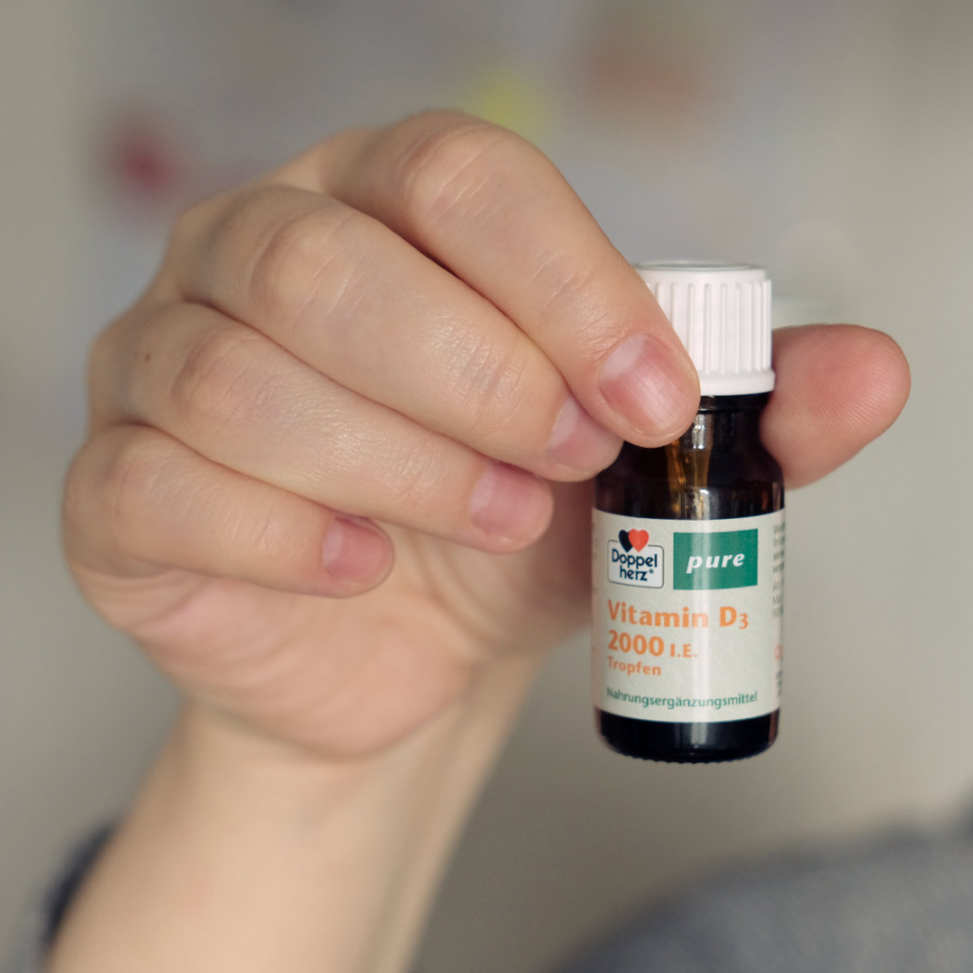“While 8.3% and 19.3% of adults have a lacking vitamin D status in summer and autumn, the figures in spring and winter are respectively 38.4% and 52.0%.”
Quoting the Journal of Health monitoring by the RKI in Germany in 2016.
It’s common knowledge, that vitamin D is produced in your skin, when you are sunbathing in UVB light. Which means, soaking up the sun is essential for the human body. Particularly during winter, it would be a good idea to go out for a walk during lunchtime and catch some natural sunlight. It is a logical consequence, that the vitamin D levels in the human body are lower during the darker months. Maybe, you should consider supplementing, particularly during winter, if sunlight is less available in your country.
Does it make sense to take a vitamin D supplement? And how much is best?
Shown in the photo above is Vitamin D3 in a bottle with carrier oil which is available at DM or at pharmacies in Germany with EAN/GTIN 4009932131604 or PZN 16753262, that I am going to “put to the test”. The dose of vitamin D this 2000 IU (international units) are equal to 50 µg. Affordable supplements are available, if you look for it.
How much to use? The following medical study published in 2019 provides a solid framework to determine the optimal dosage of vitamin D. “Daily oral dosing of vitamin D3 using 5000 TO 50,000 international units a day in long-term hospitalized patients: Insights from a seven year experience” (PMID: 30611908). If you want a more accessible format, check out the detailed video explanation by Dr. John Campbell.
Another fact: if you use a vitamin supplement, remember to keep the bottle out of the sun! Vitamin D3, also known as cholecalciferol, is very sensitive to UV radiation and will break down, if not stored in a dark bottle and kept away from light. One of the well-known advantages of a balanced level of vitamin D in the body is an optimal uptake of calcium and in this way the maintenance of healthy bones. It seems there are a lot of benefits, and it can even be considered helpful in cases of an infection or inflammation.
Is there a connection to autism and/or inflammation in the guts?
The detailed research of Dr. Michael Greger, M.D. FACLM on www.nutritionfacts.org got me interested in trying out vitamin D and taking this supplement on a regular basis since May 2021. Watch the following two short videos with studies, that are hinting in a promising direction – which maybe should be confirmed with further testing and trials in the future.
Video 1: Dietary Supplements for Autism
Showing excerpts of these two studies: “Vitamin D Status in Autism Spectrum Disorder and the Efficacy of Vitamin D Supplementation in Autistic Children” (UMIN000016770, r000016846, 2015) and Randomized controlled trial of vitamin D supplementation in children with autism spectrum disorder
Video 2: Vitamin D for Inflammatory Bowel Disease
Does it improve the immune system and reduce inflammation?
“Rigorous human clinical trials in different populations with different dosage regimens are urgently needed to check the association between vitamin D status and infection severity. Available evidence is very suggestive of protective and preventive effect of vitamin D against infections and COVID-19 pandemic.” Quoting the following article published in October 2020 (PMC7576325) Is the shielding effect of cholecalciferol in SARS CoV-2 infection dependable?
In the year 2021 Dr. John Campbell was pointing out possible associations of vitamin D status with disease severity caused by excessive inflammation in this video. Explaining a study about “Vitamin D Deficiency and Outcome of COVID-19 Patients” by Medical University Hospital Heidelberg, (MDPI, nu12092757, September 2020)
If you want to learn more about vitamin D and it’s the immune function. Check out this long in-depth video about how vitamin D works in the human body provided by Professor Roger Seheult, MD. Including research on optimal blood levels (MDPI, nu12082488, July 2020) and a meta-analysis made in 2017 with this conclusion: “Vitamin D supplementation was safe and it protected against acute respiratory tract infection overall.” (PMC5310969) ∎
| ad | annonse | anzeige | disclaimer


